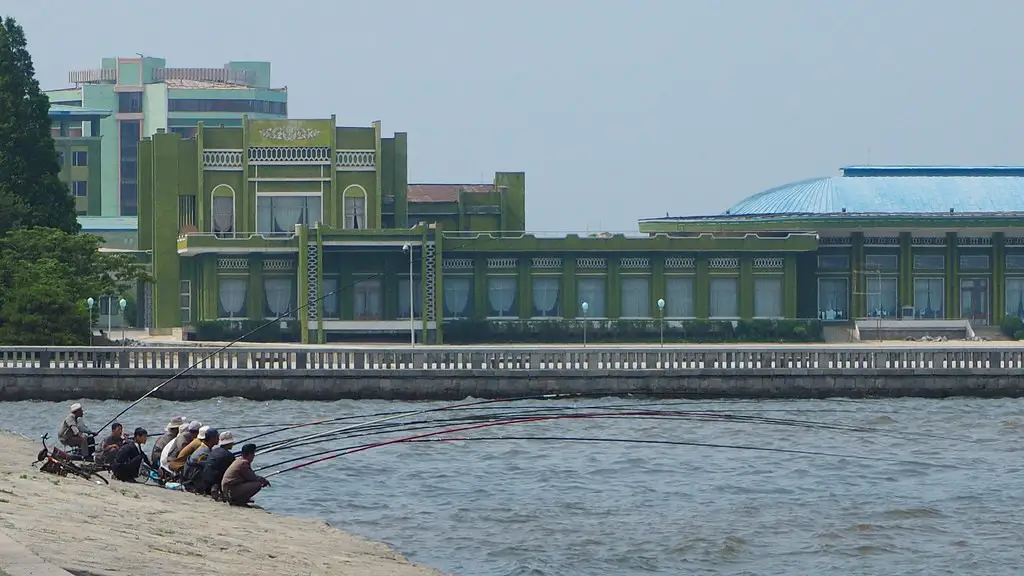Political Alliance
The relationship between Russia, China, and North Korea can be traced back to the Korean War in 1950. Both countries, who had previously been Soviet allies during the Cold War, backed the North Koreans against the South and the United Nations forces. The war ended in a stalemate, but the USSR and Beijing remained staunch allies of Pyongyang.
In politics, an alliance is the product of a bond formed between countries to cooperate and protect each other from threats. In the political alliance between Russia, China, and North Korea, this is very much the case. These three countries may differ in certain ways, but they have a common goal – to safeguard their own interests and act as a cohesive unit.
Despite being ideologically different, the strategic interests of each country incentivizes close cooperation. Russia can benefit from access to North Korea’s mineral resources and both China and Russia profit from the related trade and transit. Geographically, both countries have an interest in ensuring that yet another major power does not achieve influence in East Asia; and they hope that by supporting North Korea they can prevent this from happening.
Security
Russia and China have economic and geographic interests in North Korea, but they also view the state as an important security partner. On a geopolitical level, both countries believe that North Korea can serve as a buffer between them and the United States and its allies in the region. Thus, these countries strive to ensure that the Kim regime is stable and its borders secure.
Moreover, both Russia and China view North Korea as a useful partner in resolving their disputes with the United States. Balancing their positions through the Pyongyang government inhibits American interference in their affairs, as it offers some form of a third party which can confer or negotiate between them.
Finally, North Korea is a useful ally in the fight against terrorism and non-state actors. The Kim regime has a long history of supporting global terrorism and it is only through the cooperation of Russia, China, and North Korea that these activities can be curtailed.
Political Benefits
By supporting North Korea, both Russia and China gain more leverage in their disputes with the U.S. and other nations. The Kim regime is widely considered to be an erratic and unpredictable actor, and its nuclear capabilities make it an intimidating adversary. As such, its allies are afforded the political benefits of being associated with Pyongyang.
Moreover, the political benefits are two-fold for Russia and China. On the one hand, it bolsters their positions on the international stage, as they can appear to be legitimate partners and brokers in dealing with North Korea’s nuclear weapons and other security issues. Secondly, they can use the state to win diplomatic points with the United States.
This can be seen in the lead up to the Singapore Summit in 2018, where China was hailed as a key player in negotiating the summit. While the Trump Administration was initially displeased with Beijing’s part in the process, it eventually recognized the Chinese role in facilitating discussions with the Kim regime.
National Interests
What’s clear is that nations support one another for the purposes of their own national interests. Russia, China, and North Korea’s interests are served best by having close ties. This is why, despite the international dispute and criticism of the Kim regime, the two countries refrain from taking further action against the state.
It is often seen in basic human interactions that people are more likely to act towards their own interests, rather than for the benefit of others. This is the same with nations, especially those that share a common goal or objective. In this case, it is the strategic interest of their own security and global influence.
It is easy to criticize Russia and China’s support of North Korea and condemn their actions as irresponsible or immoral. But in truth, the two countries are merely acting out of their own interests – and in the case of North Korea, it is a matter of both security and economic interests.
China-North Korea Relations
China remains North Korea’s most important diplomatic ally and has maintained close relations with the Kim dynasty since the two states first formed a relationship in the 1950s. Beijing values the North Korean regime from a strategic perspective; and from a trade perspective, roughly 90 percent of North Korea’s trade relies on China.
The two countries even share similar national policies, such as an emphasis on a strong economy and the parallel state censorship of media and internet. China appreciates North Korea’s refusal to liberalize its society, giving it a strategic security buffer and a model of authoritarian governance.
China’s relationship with the North Korean regime is complex, contradictory and heavily influenced by the global geopolitical climate; and while it has imposed certain UN sanctions in recent years, it is careful not to put too much strain on North Korea, as it may result in instability in the country, and therefore a disruption of its own strategic interests.
Russia-North Korea Relations
Russia, which is often overlooked when it comes to the North Korean problem, has maintained a relationship with Pyongyang since the 1950s. In terms of economics, Moscow has become increasingly important; between 2000 and 2013, trade between the two countries rose by almost 1000 percent, and it is estimated that nearly one-third of North Korea’s imports.
The two countries have also engaged in a number of activities, including cross-border trade, military cooperation and joint projects, such as the construction of an oil pipeline between Russia and North Korea, as well as the opening of a North Korean-Russian industrial complex in the North.
Furthermore, Russia has frequently used North Korea to serve its own diplomatic interests and to present an alternate narrative on the North Korean situation. Russia has repeatedly called for a peaceful and diplomatic resolution to the conflict and has provided an alternative to the United States’ hardline stance. This has allowed Moscow to gain greater influence over the issue and to position itself as a legitimate broker for peace in the region.
Military Relations
Russia and China’s security interests in North Korea are also intertwined with their military relations. Both countries are key military partners and have provided North Korea with economic and political support. Over the years, China and Russia have sold the North Korean government military hardware, provided technical personnel and trained North Korean military personnel.
In recent years, these two countries have also provided support in the nuclear weapons program. Russia has offered technical and diplomatic assistance, while the People’s Liberation Army (PLA) reportedly supplied components for building North Korea’s missiles.
Furthermore, both countries have used North Korea to forward their own foreign policy objectives. Russia has used North Korea as a way to demonstrate its own military prowess, while China has used its partnership with North Korea as a way to counterbalance U.S. influence in the region.
Economic Aid
Although economic assistance has been provided in the past, Russia and China have recently been more focused on trade. Over the years, both countries have provided the North Korean regime with food aid, energy subsidies and other forms of assistance.
China has long been a major source of economic aid to North Korea, with estimates suggesting that it may have provided up to $2.6 billion in aid in 2017 alone. This includes food, energy and other resources, as well as loans and other forms of assistance.
Russia, too, has given extensive economic assistance to North Korea. In 2017, it provided food aid, construction materials and fuel, in addition to assistance with developing North Korea’s economy and infrastructure.
In addition to economic assistance, both countries have also provided technical assistance, such as with the construction of the North Korean apartment complex in Pyongyang, as well as training and advice in fields such as agriculture and industry.
Conclusion
Russia and China’s support for the North Korean regime is often seen as controversial and irresponsible. However, the relationship between these three countries is far more complex than it appears.
Russia and China do not support North Korea for the purpose of aggrandizing the Kim dynasty or providing aid to a foreign state. Instead, these countries are motivated by their own economic, political, and strategic interests in the region, and these interests can only be served if North Korea is stable, secure and able to cooperate.


